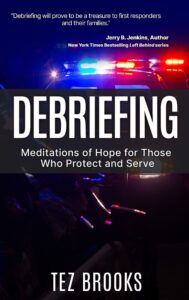In our last article, we discussed how to prepare for an interview.  Today, we will explore how to conduct the actual interview like a pro. Including other people’s stories brings a richness to your book or article.
Today, we will explore how to conduct the actual interview like a pro. Including other people’s stories brings a richness to your book or article.
When writing Debriefing, my devotional book for first responders, I included incredible events from the everyday lives of public servants. This meant speaking with several people for both touching and traumatic experiences. The following tips can make for a pleasant and stress-free conversation.
During the Interview
If you are meeting in person, bring the following:
- A smile
- Two bottles of water (one for each of you)
- A legal consent form for the interview and the photos
- A small gift to give after the interview
Focus on one main character (usually the interviewee) by asking lots of personal questions or history. Consider any overwhelming problem in the story you want to capture. How did it affect them physically, emotionally, and mentally? Take your time here—these details help pull the reader into the story.
Next, you’ll concentrate on the solution and their life since that event. How have they changed? Then go back and fill in any gaps in the story. Remember to:
- Get the correct spellings for names, places, and organizations.
- Ask deeper questions when their eyes light up on certain topics.
- Avoid questions that seem to sensationalize.
- Approach sensitive topics slowly.
- Be empathetic. Rather than “How did that make you feel?” say “That must have been hard.”
- Give the option not to answer some questions.
- Pause before the next question giving them time to say more.
- Read body language and facial expressions.
- Avoid giving interviewees the impression they can review and approve the final story before it’s published. Allowing them to rubber stamp your story is not standard practice and could cause you more work.
- Do not go overtime. 90 minutes is more than sufficient.
- Ask if they know of others who might like to be interviewed.
After the Interview
- Thank them.
- Send them links to the published story. If in print, mail them at least two copies.
- Share any reader feedback with the interviewee. They need to know they helped someone through their story.
- Keep their contact info for future interviews.
With a strategic and organized plan, you can take the stress out of interviewing and end up having an enjoyable conversation while making the guest your new friend and a trusted resource for future writing endeavors.
_________________________
As a multiple award-winning author, filmmaker, and international speaker, Tez Brooks has appeared in Guideposts, Power for Living, The Upper Room, CBN.com, Clubhouse, Focus on the Family, and more. His book The Single Dad Detour won Book of the Decade with Serious Writer Academy and Christianity.com featured him in “50 Authors You Should Know.” He is a member of Colorado Authors League and Word Weavers Intl. You can learn more at TezBrooks.com.

